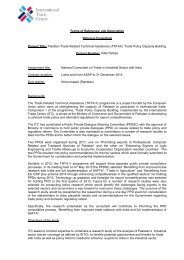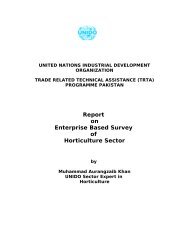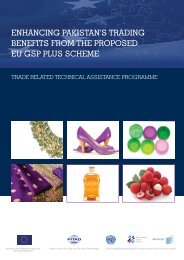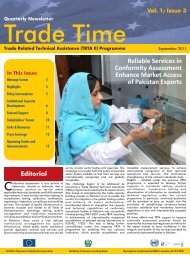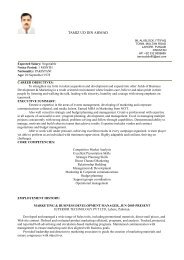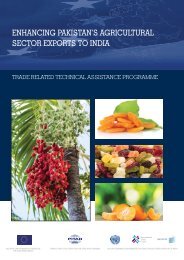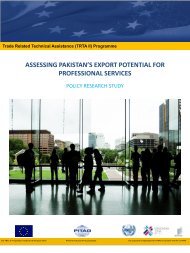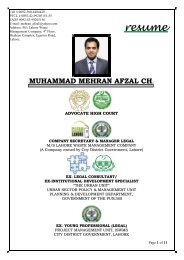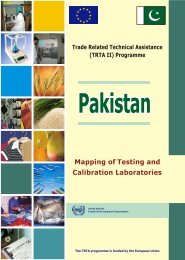Enhancing dairy sector export competitiveness - International Trade ...
Enhancing dairy sector export competitiveness - International Trade ...
Enhancing dairy sector export competitiveness - International Trade ...
Create successful ePaper yourself
Turn your PDF publications into a flip-book with our unique Google optimized e-Paper software.
ENHANCING DAIRY SECTOR EXPORT COMPETITIVENESS IN PAKISTANDrug Administration (FDA) with improved administrative and technical capacity in the regulation of food,drugs, cosmetics and device establishments and products.Import Regulationsi. Import licenses/permits are to be acquired and a Certificate of Product Registration (CPR),renewable annually, must be secured from BFAD prior to initial importation.ii.iii.iv.All agricultural and food products entering the Philippines must be accompanied by a phytosanitaryor health certificate issued by the regulatory body in the <strong>export</strong>ing country. This is requiredto be submitted for inspection along with the import permit to facilitate physical inspection of thegoods and customs clearance at the port of entry.All imported food and agricultural products are required to comply with the Philippines’ food healthand phyto-sanitary laws. In general, none of these products is allowed to enter the Philippines if itis deemed to pose a danger to human life or well-being, either directly or indirectly.All food and agricultural products, including plant products that enter the Philippines, are requiredto pass through procedures designed to check that they are not contaminated with any pest andthat they are fit for their intended use.v. Under Philippine import laws, it is the responsibility of the importer to ensure that any productentering the country’s customs territory is in full compliance with Philippine health and phytosanitaryregulations. The enforcing authorities will check for compliance by inspecting the goodsand relevant import/<strong>export</strong> documentation and decide on whether the goods may enter thePhilippines.vi.vii.viii.ix.Labeling requirements: Name of the food, List of ingredients used in the product (in decreasingorder of proportion), including additives, flavorings and preservatives used; Net contents anddrained weight; Name and address of manufacturer/packer or distributor, including country oforigin for imported products and name and the address of Philippine importer/distributor; Lotidentification.BFAD requires that importers provide advance copies of the labels of the products they intend toimport.All processed food products offered for retail sale in the Philippines must be registered with BFAD.Registration of imported products may only be undertaken by a Philippine entity, although somedocumentation and, for certain types of products, samples need to be provided by the <strong>export</strong>er.Exporters should also note that a Philippine importer needs to secure a License to Operate (LTO)from BFAD, which is actually a prerequisite for the registration of any food product. 145ThailandThe Thai FDA is the principal department of the Ministry of Public Health (MOPH) and in-charge ofconsumer safety in the consumption of food. They have six basic responsibilities: (i) to legislatenotifications of the Ministry of Public Health, (ii) pre-marketing controls, (iii) post-marketing controls, (iv)surveillance, (v) support and cooperate with the technical side of the food industry, an (vi) disseminateknowledge and develop public awareness for health food choices.The food regulatory system works in a vertical system. This means regulations, quality standards andsome safety standards (such as micro-organisms and some food additives) are created specifically forproducts such as milk, vinegars, sauces, candies, jams, mineral water, dietary supplements andsupplementary food for infants and young children.145 www.bfad.gov.ph, www.da.gov.ph92



